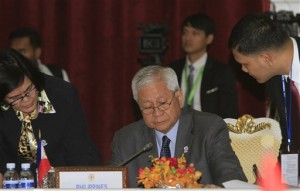Asean sharply split on West Philippine Sea row

Philippines' Foreign Secretary Albert del Rosario, center, prepares his documents as he attends Asean-Australia Ministerial Meeting in Phnom Penh, Cambodia, Wednesday, July 11, 2012. The Philippines is leading a push for Asean to unite to propose to China a code based on a UN law on maritime boundaries that would delineate the areas belonging to each country. AP PHOTO/HENG SINITH
PHNOM PENH—Southeast Asian states were sharply divided Wednesday over how to deal with recent disputes with Beijing as they attempted to agree a draft code of conduct for the flashpoint West Philippine Sea (South China Sea).
Meeting at a summit of the Association of Southeast Asian Nations (Asean), foreign ministers wrangled over whether to include a reference in their joint statement to recent rows pitting China against Vietnam and the Philippines.
The Philippines wants the statement to mention a recent standoff over the Scarborough Shoal, which it claims, but summit organizer Cambodia, a staunch Chinese ally, has opposed Manila’s proposal, diplomatic sources said.
Southeast Asian diplomats described the division on the joint statement as “sharp” and the discussions “intense.”
Indonesian Foreign Minister Marty Natalegawa said diplomats were still attempting to reach a consensus.
“It’s a consensus draft. It’s a compromise text so no one will be 100 percent happy,” he told reporters.
Asean members and China held joint talks on the proposed West Philippine Sea code – which spells out rules of behavior to prevent conflicts – amid disagreements over what it should include and how it should be implemented.
The Philippines is leading a push for Asean to unite to propose to China a code based on a UN law on maritime boundaries that would delineate the areas belonging to each country.
Beijing has said it is prepared to discuss a more limited code aimed at “building trust and deepening cooperation” but not one that settles the territorial disputes, which it wants to negotiate with each country separately.
Chinese Vice Minister of Foreign Affairs Fu Ying told reporters after the Asean-China meeting on Wednesday that Beijing would seriously consider the Asean bloc’s proposal to start talks on the code.
“The Chinese minister would like to give serious consideration of the proposal. There is a positive note and also a hope that there will be conditions for proceeding (with the talks),” Fu said.
Efforts to produce a code began 10 years ago, but Asean secretary general Surin Pitsuwan said nations were now engaging seriously and efforts were being made to “move along.”
US Secretary of State Hillary Clinton arrived in Cambodia on Wednesday and held talks with Asean foreign ministers. She will take part in a wider regional Asian summit beginning on Thursday.
Washington is pushing for progress on reducing friction in the West Philippine Sea – a key shipping lane that is vital to the world economy – but is also keen to expand its engagement in trade, development aid and disaster relief.
“What we have heard from you is that Asean and the countries of the Asia-Pacific are seeking greater American engagement across the board,” Clinton said Wednesday.
“But you are particularly focused on areas where our presence at times has been underweighted,” she added.
Clinton said in Vietnam on Tuesday that the West Philippine Sea would be discussed alongside other areas of mutual concern at the Asean Regional Forum (ARF), which groups 26 Asia-Pacific countries and the European Union and starts Thursday.
This risks irking Beijing after the Chinese foreign ministry warned on Tuesday against “hyping” the problem and said its matters should be kept out of the summit.